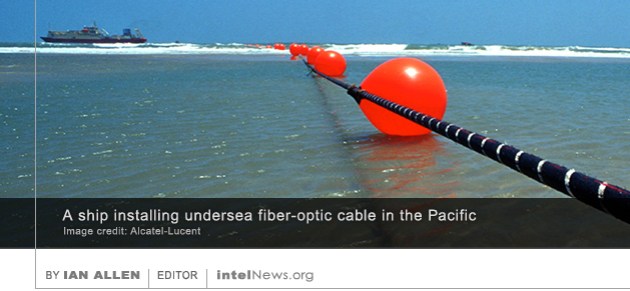Russian subs looking for undersea Internet cables, say US officials
October 26, 2015 3 Comments
 An increased presence of Russian submarines near American territorial waters appears to correspond to the location of undersea Internet cables used for commercial and military communications, according to officials. Citing “more than half a dozen” American and European officials, including naval commanders and intelligence professionals, The New York Times said on Sunday that the United States Department of Defense was paying close attention to what it described as “significantly increased Russian activity” along known routes of the cables. The paper was referring to Russian underwater vessels, which Washington believes are equipped with technology designed to tap into the cables, or even to sabotage them, by severing them.
An increased presence of Russian submarines near American territorial waters appears to correspond to the location of undersea Internet cables used for commercial and military communications, according to officials. Citing “more than half a dozen” American and European officials, including naval commanders and intelligence professionals, The New York Times said on Sunday that the United States Department of Defense was paying close attention to what it described as “significantly increased Russian activity” along known routes of the cables. The paper was referring to Russian underwater vessels, which Washington believes are equipped with technology designed to tap into the cables, or even to sabotage them, by severing them.
According to The Times, officials at the Pentagon believe that Moscow is less interested in tapping into the cables and more interested in mapping their location so that it can attack them during a hypothetical clash with the US. Superficially, the paper said that, according to US officials, the Russian Navy appeared to be seeking to locate the precise coordinates of the fiber-optic cables. The ultimate goal was to sever them “at some of their hardest-to-access locations” if Russia ever needed to disrupt the flow of communication to and from the US. The Russian submarines seem to be seeking some of the deeper locations of the undersea cable networks, which would make it harder for repair crews to locate and repair severed fiber-optic cables.
The New York Times said that, alongside commercial Internet cable networks, Russian submarines were looking for military networks, whose location is usually classified. The paper quoted a European diplomat, who said anonymously that Russian submarine patrols in American territorial waters had increased by nearly 50% since 2014. The level of activity of Russian submarines was now “comparable to what we saw in the Cold War”, said the diplomat.
► Author: Ian Allen | Date: 26 October 2015 | Permalink







We tapped their cables during the cold war – so why would they not want to return the favor?
Since the internet runs everything today – severing the cables would wreck havoc with the world
The transition from Cold War to Cold Peace hardly brought any change in the war on communications. People tend to forget that we’re living in a communications bubble that can burst by the tiniest prick from any hostile power. Internet, telephone and satellite communications can be disrupted or destroyed in a blink of an eye. However, eliminating communications might not always be the best approach to neutralize an opponent. It’s easy to destroy cables or communications satellites, but the military can easily counter this by launching large numbers of small comms satellites in orbit. SIGINT or EW towards the opponent’s operational or commercial communications may prove tactically far more effective. Therefore, I doubt the Russian Navy would ever destroy those cables and, as they say, “cut their own throats” by depriving themselves from some excellent SIGINT. A slight smell of propaganda maybe? Russian subs and undersea cables, they weren’t the first, nor the last. It all reminds me of Operation IVY BELLS:
http://rijmenants.blogspot.be/2009/12/operation-ivy-bells.html
To me, it all seems business as usual. Just as prior to the fall of the Berlin wall 26 years ago (by some mistakenly seen as the end of the Cold War ;-) SIGINT still is, even more than before, the premier league of the Cold Peace.
http://users.telenet.be/d.rijmenants/en/coldwarsignals.htm
Thanks for publishing this awesome article. I’m a long time reader but I’ve
never been compelled to leave a comment. I subscribed
to your blog and shared this on my Facebook. Thanks again for a great
article!